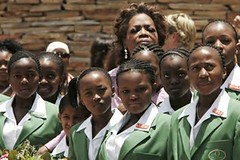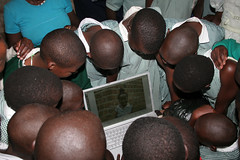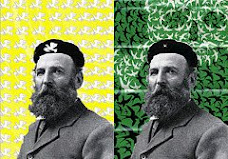It's understandable that Jews would like to dissociate what the Israeli government is doing from comparisons with the Apartheid state. The semantics of Apartheid in the Western mind is that of a moral black hole. And once you are tainted with it, once you fall with in its orbit, your done for.
Mhambi chanced when browsing Digg on Uri Avnery's article Israel and Apartheid. He claims the Jewish state's methods might at times approximate that of the Apartheid government's, but that the substance of the state of Israel is different. He sites the following as reasons:
(a) In SA there was a conflict between Blacks and Whites, but both agreed that the state of South Africa must remain intact - the question was only who would rule it. Almost nobody proposed to partition the country between the Blacks and the Whites.
Our conflict is between two different nations with different national identities, each of which places the highest value on a national state of its own.
(b) In SA, the idea of "separateness" was an instrument of the White minority for the oppression of the Black majority, and the Black population rejected it unanimously. Here, the huge majority of the Palestinians want to be separated from Israel in order to establish a state of their own. The huge majority of Israelis, too, want to be separated from the Palestinians. Separation is the aspiration of the majority on both sides, and the real question is where the border between them should run. On the Israeli side, only the settlers and their allies demand to keep the whole historical area of the country united and object to separation, in order to rob the Palestinians of their land and enlarge the settlements. On the Palestinian side, the Islamic fundamentalists also believe that the whole country is a "waqf" (religious trust) and belongs to Allah, and therefore must not be partitioned.
(c) In SA, a White minority (about 10 percent) ruled over a huge majority of Blacks (78 percent), people of mixed race (7 percent) and Asians (3 percent). Here, between the Mediterranean and the Jordan River, there are now 5.5 million Jewish-Israelis and an equal number of Palestinian-Arabs (including the 1.4 million Palestinians who are citizens of Israel).
(d) The SA economy was based on Black labor and could not possibly have existed without it. Here, the Israeli government has succeeded in excluding the non-Israeli Palestinians almost completely from the Israeli labor market and replacing them with foreign workers.
Mhambi disagrees because with Uri because:
a) The conflict in South Africa was about much more than just race, it was about two and even more competing nationalisms, mainly the Afrikaner and African nationalist. There was then and is now a vigorous and growing debate on the merits of a separate Afrikaner volkstaat.
b) Apartheid did oppress the black majority and an increasing amount of black South Africans did reject it as time went by. By no means all did, especially early on. And if the government had not designated 80% white, this turning against apartheid might have been different. Towards the end a significant part of the largest ethnic black group - the Zulus - still wanted to have their own national territory. Black South Africans did not necessarily want to live with white ones, they wanted power first and foremost.
c) At the beginning of the previous century the numbers of whites was only slightly less than the the numbers of black South Africans. Black South Africans had however a much higher fertility rate, and black Africans have migrated from all over Southern Africa to work in South Africa for decades.
d) It's allot more complicated. The original South African communist party, which was very Afrikaner (and Jewish), tried to exclude black Africans - who were streaming to Johannesburg - from the labour market with their slogan "Workers of the world unite and fight for a white South Africa." They failed, because black Africans would do the work much cheaper, and because foreign capital controlled the economy.
Of course there are huge differences between South Africa and Israel. But the resemblances are striking. One of the obvious ones is that both the Afrikaners and Jews feel themselves in danger as a people. Instead of trying to argue that what is happening in Israel is not like what happened in South Africa, Jews would do better to look at what is happening in South Africa after apartheid ended and learn from it.
On the one hand, Afrikaners have reached escape velocity, they are no longer the paraihs of the world. But on the other hand, Afrikaners are leaving South Africa in droves.
Uri would do well to read up on South African history before he shoots himself in the foot. This excellent article on the special relationship between Jew and Afrikaner is a good place to start. Sphere: Related Content









